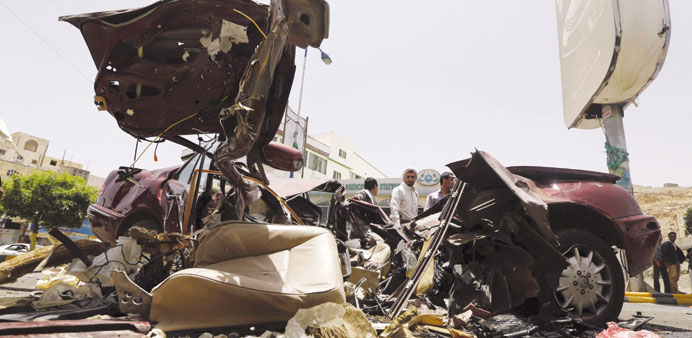People look at a car damaged by an air strike on a nearby missile base in Sanaa yesterday.
AFP/Sanaa
Saudi-led air strikes on a missile depot in Yemen’s rebel-held capital yesterday sparked explosions that left at least 28 people dead and nearly 300 wounded, flattening houses and shaking faraway neighbourhoods.
Many more people were feared to have been killed after two strikes hit the hilltop depot, leaving a trail of destruction in the Fajj Attan area of Sanaa which was covered in thick clouds of smoke.
A coalition of Arab nations led by Saudi Arabia launched the air campaign against the Houthi Shia rebels last month, vowing to restore the authority of President Abd-Rabbu Mansour Hadi, who fled to Riyadh as the militiamen advanced on his southern refuge of Aden.
Riyadh has accused Iran of backing the rebels.
Yesterday’s strikes triggered a series of blasts that sent shockwaves across Sanaa, leaving cars mangled, buildings gutted and streets completely scattered with debris.
Fires broke out at the missile base and a nearby petrol station, witnesses said, and the scorching heat could be felt from a distance.
Civilians were seen emerging from their shattered homes in the aftermath, some carrying suitcases and apparently stunned at the scale of the destruction outside.
Hours later, medics said the number of civilians killed was now at least 28, up from 18, including three television station employees. Almost 300 people were wounded.
The targeted base belongs to the missile brigade of the elite Republican Guard, which remained loyal to former president Ali Abdullah Saleh who has been accused of siding with the Houthi rebels in their fight against the government.
The Houthis have seized control of large parts of the nation, including Sanaa, and fought fierce battles with pro-government forces.
The Saudi-led coalition says it has carried out more than 2,000 strikes since the start of the campaign, gaining complete control of Yemeni airspace and knocking out rebel infrastructure.
But its spokesman, Brigadier General Ahmed al-Assiri, gave no comment about yesterday’s blasts in Sanaa during his daily media briefing.
Fighting continued in the south between advancing rebels and local fighters who have sided with Hadi. Eleven rebels and five southern fighters were killed in Huta, the provincial capital of Lahj, the military said.
The UN says the conflict has left hundreds dead and thousands wounded, and there has been increasing concern of a huge humanitarian crisis.
Calls have been growing for peace talks, but authorities yesterday rejected an Iranian offer of mediation.
“Any mediation effort coming from Iran is unacceptable because Iran is involved in the Yemen issue,” said Yemeni Foreign Minister Riyadh Yassin.
“The Houthis and Saleh forces must withdraw from all cities and villages of Yemen, including Sanaa and Aden, return to (their northern stronghold of) Saada as civilians, and lay down their arms,” he said.
“After that we can talk about dialogue and a political solution. But now there is no room for negotiations.”
The exiled authorities was boosted on Sunday when the commanders of 25,000 troops in Hadramout province, the country’s largest and on the border with Saudi Arabia, expressed their support for Hadi and his “constitutional legitimacy”.
Al Qaeda militants have taken advantage of the chaos to seize territory including an army camp in Hadramout, an airport and provincial capital Mukalla.
Yesterday, a US drone killed five Al Qaeda suspects in a raid that struck two vehicles in Saeed, in Shabwa province.
Saudi alerts security forces
Reuters/Riyadh
Saudi Arabia has put security forces on alert for a possible militant attack on a shopping mall or energy installation, interior ministry spokesman Mansour Turki said yesterday.
“There was information about a possible act targeting a mall or Aramco installations. We passed this information to the security forces to be on alert,” he told Reuters.
Turki said he had no further information about the threat. Saudi Arabia has been a target of militant groups for years, including Al Qaeda and Islamic State.
Riyadh has been carrying out air strikes against Iran-allied Houthi rebels in Yemen since March 26 in a conflict in which nine members of its security forces have been killed by cross-border fire.
This month Saudi police announced they had detained a Saudi citizen suspected of shooting dead two police officers and injuring two others in two separate attacks in Riyadh.
“Saudi Arabia is targeted by terrorism. Usually in such situations (conflicts), there are attempts by terrorist groups to take advantage and carry out attacks,” said Turki.
On Saturday, guards at the gates of a central Riyadh shopping mall stopped single men from entering and searched the bags of female shoppers, Reuters reporters said.
In 2006, four Al Qaeda militants breached the gates of Saudi Aramco’s Abqaiq plant but did not manage to cause significant damage before being killed in a shootout with security guards, Saudi authorities said.
However, a US diplomatic cable from the same year released by WikiLeaks quoted the then-US ambassador as saying he understood that “the attack on Abqaiq had been much closer to succeeding than generally acknowledged”.
At the time, Abqaiq processed 70% of Saudi crude.
Subsequent US cables documented American assistance to the Saudis in strengthening the security of energy infrastructure, including the establishment of a dedicated, 40,000-strong Facilities Protection Force.

